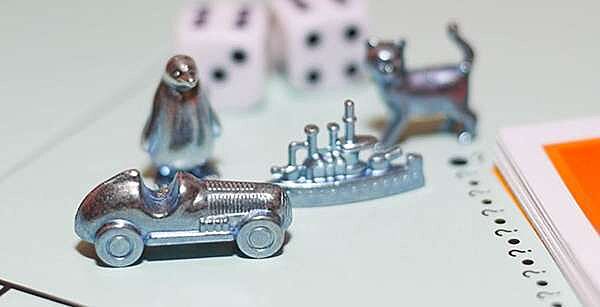Rigged Monopoly game sheds light on food insecurity, overeating in novel UF Health study

 How would you feel if you collected only $100 every time you passed “Go” in a game of Monopoly while the other players collected $200? Or if you rolled one die while the others rolled two dice?
How would you feel if you collected only $100 every time you passed “Go” in a game of Monopoly while the other players collected $200? Or if you rolled one die while the others rolled two dice?
According to a new study led by University of Florida Health researcher Michelle Cardel, Ph.D., R.D., adolescent girls who play the game with the odds stacked against them may seek solace in food.
The study, published in the November issue of Obesity, explored the role of food insecurity and perceived social status — a sense of an individual’s place in the community and in American society —on eating behaviors in Hispanic teens in the U.S., who are disproportionately affected by obesity.
“The rigged Monopoly game was intended to recreate in the laboratory the sense of frustration and powerlessness that many low-income Americans deal with every day — especially minority racial and ethnic groups,” said Cardel, an assistant professor and obesity and nutrition scientist in the UF College of Medicine.
The study team found Hispanic teenaged girls assigned to the “low social status” role during the game consumed about 200 calories more over the next 24 hours than girls assigned to the “high social status” role.
“If this pattern of overeating persists, over the course of a lifetime, it could increase the teens’ risk for obesity and obesity-related health problems, including high blood pressure, heart disease and diabetes,” Cardel said.
According to the Centers for Disease Control and Prevention, Hispanic teens are disproportionately affected by obesity, with a prevalence of 28% among Hispanic boys and 23.6% among Hispanic girls, compared with whites (14.6% of boys and 13.5% of girls), African Americans (19.0% of boys and 25.1% of girls) and Asians (11.7% of boys and 10.1% of girls).
Other studies have suggested that social determinants of health such as food insecurity, discrimination and low social status, which are also disproportionately experienced by racial and ethnic minorities, may contribute to the problem.
Although it’s not exactly clear why, the association between low social status and weight is even more pronounced among females and racial and ethnic minorities, she added.
The research team recruited 133 Hispanic teen boys and girls ages 15 to 21 who were randomly assigned to either a “high social status” or “low social status” role during the game. High social status players received a Rolls Royce game piece, were assigned the role of banker, started the game with $2,000, collected $200 when they passed “Go,” and rolled two dice during their turn, giving them a chance to “roll their way” out of jail with doubles instead of paying a $50 fine.
“Low social status” players received the shoe game piece, started the game with $1,000, collected $100 after passing “Go,” and rolled only one die during their turn, preventing them from rolling their way out of jail.
After the game, participants were offered an all-you-can-eat lunch, and were instructed to keep a food diary for 24 hours.
Participants in the “low social status” role reported they experienced a decrease of perceived powerfulness and increased frustration during the game, and they ended the game with significantly less cash, property and total winnings.
“These findings suggest that the rigged Monopoly game was successful in altering short-term feelings related to low social status among the participants,” Cardel said. “Our results also suggest that low perceived social status — even for a short period of time — can lead to overeating, especially among girls and individuals who are dealing with food insecurity.”
Cardel and other researchers hypothesize that food insecurity may lead some individuals to overeat when food is available to compensate for potential food shortfalls in the future.
“Our work, together with the work of others, suggests that experiencing poverty, food insecurity, discrimination and adverse childhood experiences may create an environment that promotes weight gain and increases a teen’s risk for developing obesity and other obesity-related diseases like Type 2 diabetes,” she said.
Media contact: Ken Garcia at kdgarcia@ufl.edu or 352-273-9799.